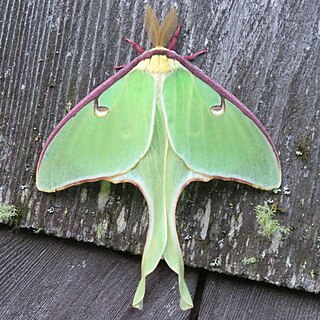
The luna moth, also called the American moon moth, is a Nearctic moth in the family Saturniidae, subfamily Saturniinae, a group commonly named the giant silk moths.
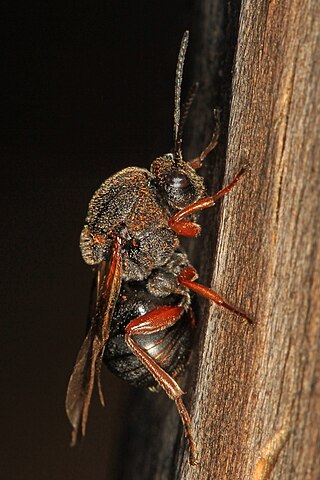
Gall wasps, also traditionally calledgallflies, are hymenopterans of the family Cynipidae in the wasp superfamily Cynipoidea. Their common name comes from the galls they induce on plants for larval development. About 1,300 species of this generally very small creature are known worldwide, with about 360 species of 36 different genera in Europe and some 800 species in North America.

The codling moth is a member of the Lepidopteran family Tortricidae. They are major pests to agricultural crops, mainly fruits such as apples and pears, and a codling moth larva is often called an "apple worm". Because the larvae are not able to feed on leaves, they are highly dependent on fruits as a food source and thus have a significant impact on crops. The caterpillars bore into fruit and stop it from growing, which leads to premature ripening. Various means of control, including chemical, biological, and preventive, have been implemented. This moth has a widespread distribution, being found on six continents. Adaptive behavior such as diapause and multiple generations per breeding season have allowed this moth to persist even during years of bad climatic conditions.

The Herminiinae are a subfamily of moths in the family Erebidae. The members of the subfamily are called litter moths because the caterpillars of most members feed on dead leaves of plants, though others feed on living leaves, and/or the mushrooms of fungi as in the case of genus Idia.

Zanclognatha tarsipennalis, the fan-foot, is a species of litter moth of the family Erebidae. It is found in Europe and east across the Palearctic to Siberia, Amur, Ussuri, Japan, Taiwan, Korea and China.
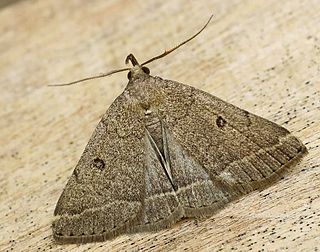
Zanclognatha zelleralis, the dusky fan-foot, is a species of moth of the family Noctuidae. It was described by Maximilian Ferdinand Wocke in 1850. It is found in central and southern Europe.
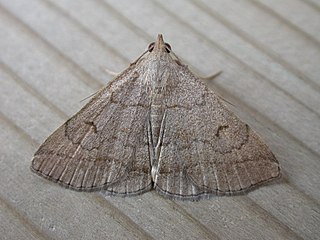
Zanclognatha lunalis, the jubilee fan-foot, is a moth of the family Noctuidae. The species was first described by Giovanni Antonio Scopoli in his 1763 Entomologia Carniolica. It can be found across the Palearctic realm.

Zanclognatha is a genus of litter moths of the family Erebidae. The genus was erected by Julius Lederer in 1857.
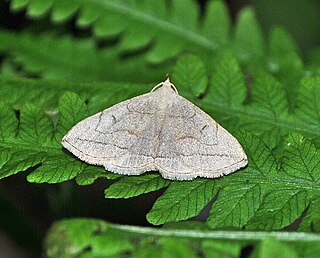
Zanclognatha pedipilalis, the grayish zanclognatha, is a litter moth of the family Erebidae. The species was first described by Achille Guenée in 1854. It is found in eastern North America, from Nova Scotia south to Florida and Mississippi, west to Alberta and Kansas.
Zanclognatha atrilineella is a litter moth of the family Erebidae. It was described by Augustus Radcliffe Grote in 1873. It is found in the southeastern United States.
Zanclognatha jacchusalis bryanti is a moth of the family Noctuidae. It was described by William Barnes in 1928. It is found from British Columbia to Oregon.

Zanclognatha cruralis, the early zanclognatha, is a species of litter moth of the family Erebidae. It is found from Wisconsin east through southern Canada, south to Florida and Texas.
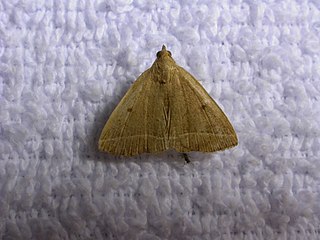
Zanclognatha marcidilinea, the yellowish zanclognatha, is a litter moth of the family Erebidae. It was described by Francis Walker in 1859. It is found in North America from Nova Scotia to Missouri, south to Florida and Arkansas.

Zanclognatha protumnusalis, the conifer zanclognatha, is a litter moth of the family Erebidae. It was described by Francis Walker in 1859. It is found from southern Canada to Florida and Texas.

Zanclognatha laevigata, the variable zanclognatha, is a litter moth of the family Erebidae. It was described by Augustus Radcliffe Grote in 1872. It is found in North America from Manitoba to Nova Scotia, south to Florida and Missouri.

Zanclognatha lituralis, the lettered zanclognatha, is a litter moth of the family Erebidae. It was described by Jacob Hübner in 1818. It is found from in North America from Wisconsin to Nova Scotia, and south to Florida and Texas.

Zanclognatha martha, the pine barrens zanclognatha or Martha's zanclognatha, is a litter moth of the family Erebidae. It was described by William Barnes in 1928. It is found from Ohio to Maine, south in the mountains to North Carolina and along the Coastal Plain to Texas. It is listed as threatened in the US state of Connecticut.
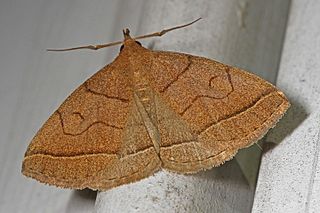
Zanclognatha obscuripennis, the dark zanclognatha, is a litter moth of the family Erebidae. It was described by Augustus Radcliffe Grote in 1872. It is found in North America from Missouri to Quebec, south to Florida and Texas.

Zanclognatha dentata, the coastal plain zanclognatha, is a litter moth of the family Erebidae. The species was first described by David L. Wagner and Timothy L. McCabe in 2011. It is found in North America from Ontario to Nova Scotia, south through the Great Lake states and in the Appalachians to northern Georgia. One specimen from a sandhills area in central South Carolina also appears to represent Z. dentata.

Zanclognatha reticulatis is a species of litter moth of the family Erebidae. It was described by John Henry Leech in 1900. It is found in Taiwan, Japan and the Kuriles.


















